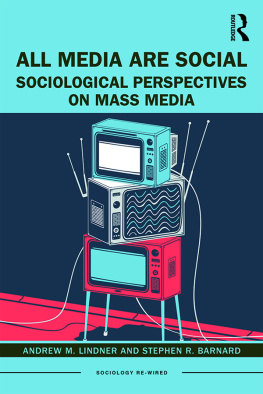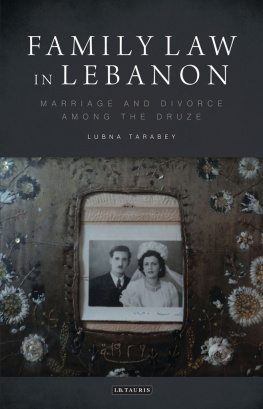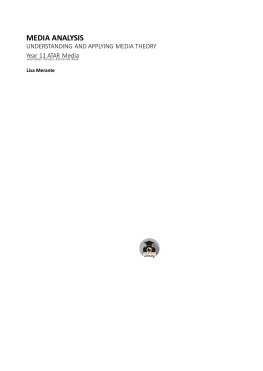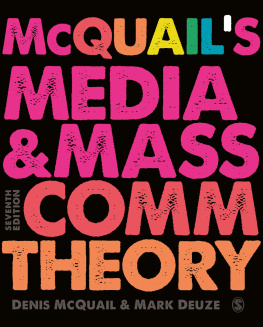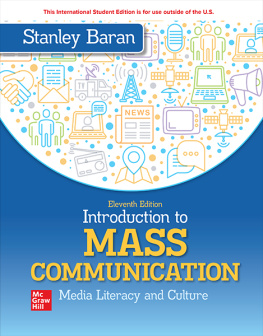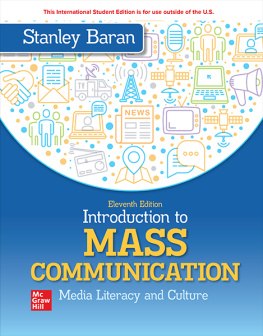
Nabil Dajani, an authoritative voice on Arab media, provides a much-needed reflection on the situation of Lebanese media. He adeptly guides the readers through the different historical changes of the media in Lebanon, a country that has been characterized by its political and religious fragmentation, which, as Dajani rightly says, represents a condensed model of the situation in the Arab East region. Dajani provides an original analysis of the Lebanese media, particularly the press, drawing attention to the reasons behind the demise of the media institutions leading to further fragmentation of the Lebanese society. In an age of fake news, where global and local media institutions are under scrutiny, Dajani postulates that Lebanese citizens lost faith in their media partially due to the medias failure to create the national unity needed to mend the moral damages of the past wars and conflicts.
Noha Mellor, Professor of Media, University of Bedfordshire, UK
This book demonstrates the importance of the historical narrative of the state of media in Lebanon in understanding how it is shaped today and why. The value of the historical investigation of the Lebanese media and the historical facts that generated from the authors personal encounters and experience as a former member of the journalism community in Lebanon is enormous. The book is a valuable addition to the literature on the media scene in Lebanon and its influencers.
Zahera Harb, Senior Lecturer, Department of Journalism, City, University of London, UK
The Media in Lebanon
Fragmentation and Conflict in the Middle East
Nabil Dajani

Published in 2019 by
I.B.Tauris & Co. Ltd
London New York
www.ibtauris.com
Copyright 2019 Nabil Dajani
The right of Nabil Dajani to be identified as the author of this work has been asserted by the author in accordance with the Copyright, Designs and Patents Act 1988.
All rights reserved. Except for brief quotations in a review, this book, or any part thereof, may not be reproduced, stored in or introduced into a retrieval system, or transmitted, in any form or by any means, electronic, mechanical, photocopying, recording or otherwise, without the prior written permission of the publisher.
References to websites were correct at the time of writing.
Library of Modern Middle East Studies 136
ISBN: 978-1-7807-6541-9
eISBN: 978-1-78672-651-3
ePDF: 978-1-78673-657-4
A full CIP record for this book is available from the British Library
A full CIP record is available from the Library of Congress
Library of Congress Catalog Card Number: available
To four great mentors:
Fuad Sarrouf,
C.K. Zurayk,
Kamal Salibi, and
Malcolm MacLean
Nabil Dajani is Professor of Media Studies at the Department of Social and Behavioral Sciences at the American University of Beirut.
Contents
Unless otherwise stated, all images are part of the authors personal collection.
Figures
Table
The idea of writing this book began fermenting in 2000 when a serious health condition furthered the plan to relate my media experience in Lebanon and the Arab region. I started going through my old files of notes, early newspaper clippings and later electronic files. Heavy involvement in academic, administrative and community work, however, kept on deferring efforts on this project. A 2011 contract with then I.B. Tauris Middle East editor Maria Marsh lead to signing a contract to write this book, then continued prodding from I.B. Tauris editors kept the project going. I am greatly indebted to Joanna Godfrey, editorial director at I.B. Tauris for her continuous follow-up on my book development and for her comments on my early chapters. Several I.B. Tauris readers made critical comments and valuable suggestions on early drafts to which I am greatly indebted. I am also indebted to Sophie Campbell, production manager for following up the final editing and production of the book. Bayan Itani, my graduate assistant, went through boxes of clippings and files organizing them by subject and date. She also was instrumental in providing me with supporting electronic documents. I owe her a debt of gratitude for help beyond the call of duty.
Recent attempts at investigating the media and its role in society tend to focus on the present media situation, particularly on the new and social media. The process of communication is an important component in the maintenance and development of social life, and it is rooted in the past. An appropriate investigation of the role the media in society therefore requires centering the attention on both the biography and the history of the present communication structures in the country.
The past is a prologue. Understanding the past is a necessary preface for the understanding of the present and for planning the future. The purpose of this study is to examine the media situation in Lebanon by investigating the different historical changes in the structure and the forces at work on these media. A historical investigation of the Lebanese media (that is unfortunately, underscored by new Lebanese media studies) is essential for a proper examination of the Lebanese media situation. Such an approach is crucial to provide a critical assessment of the prevailing forces that contribute to the fragmentation and conflict in this small state, which represents an amplified model of the situation in the Arab East region. Because the study is historical in nature, it delves into as much media management details as needed in this historical context. This is why this study goes to great lengths in discussing Lebanese print media, which is the first Lebanese mass medium.
The study and investigation of the role of the Lebanese media in the Lebanese society has been the core of my research for the past half century. My interest in this subject was stimulated by my early interactions with media channels in Lebanon in the 1950s and 1960s as the business manager of a student college paper, as news editor of a local Lebanese paper and as director of information at a university in Lebanon. I developed firsthand knowledge of the business dealings with Lebanese publications, the editing ethos in Lebanon, as well as the role of public relations and personal contacts in the Lebanese media context. Over the years, I have acquired a large volume of notes and documents that were the basis for my book on the Lebanese media: Disoriented Media in a Fragmented Society , which appeared at the end of the Lebanese Civil War, in 1993, and did not receive adequate exposure and dissemination.
In preparing this manuscript, I have updated and restructured the relevant material in the 1993 book and incorporated parts of some of my recent articles to demonstrate the vast changes that these media have undertaken. I was careful to free my presentation from any ideological interpretation of the media situation. I am here as a scholar and not as a politician.
While this manuscript integrates parts of my past work, it does not represent a new edition of this work. Rather, my new input provides a different orientation that focuses on the history and biography of the Lebanese media. It presents a synthesis of my Lebanese and Arab media observations. I have, thus stayed away from discussing at length the social media in Lebanon, as this form of media has only a short history, which is still in the making. However, I related these to the folk media inasmuch as one may view the social media as a mediated form of face-to-face communication.
Next page


